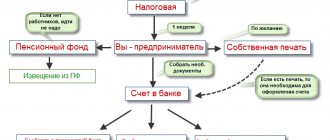Legislative aspects of property tax
The analyzed tax falls within the purview of Chapter 30 of the Tax Code of the Russian Federation. Property assets are included in the tax base according to the conditions declared in Art. 374 Tax Code of the Russian Federation. Clause 4 of this article provides a list of objects for which this tax is not required to be paid. Art. 381 of the Tax Code of the Russian Federation considers certain types of activities that do not involve the collection of this tax from the entrepreneur.
In general, Russian organizations, as well as foreign ones with a representative office in the Russian Federation, are required to pay tax on property on their balance sheet, movable, capitalized before 2013, and/or immovable. Some categories of organizations are beneficiaries.
This tax is regional, which means that the constituent entities of the Russian Federation can independently reduce the tax rate of 2.2% established by the Government.
REFERENCE! If an entrepreneur wants to find out the tax rate of his region, he can refer to the official website of the Federal Tax Service, which contains background information on various rates and benefits, including property tax.
How to calculate an advance payment on an organization's property
The tax base for calculation is the value of the property:
- cadastral;
- balance sheet
Rates are set by regional authorities, but their size is limited by Art. 308 Tax Code of the Russian Federation:
- for real estate for which the tax base is determined as book value, the rate cannot exceed 2.2%;
- for objects with cadastral value the rate is set no higher than 2%.
The amount of annual tax payable is determined as follows:
The amount of the advance payment is determined and paid quarterly. Advance payments for property tax 2020 for legal entities are calculated as follows:
Who will make and submit payments?
According to the legislation of the Russian Federation, payers of property tax are those organizations in respect of which three conditions are met:
- ownership, temporarily, by power of attorney or part-time ownership of real estate and/or movable property included in the balance sheet before 2013, not included in depreciation groups 1 and 2;
- accounting of these property assets is carried out in accounts 01 “Fixed assets” or 03 “income investments in tangible assets”;
- all these assets are provided for by the corresponding article of the Tax Code (Article 374) and are not included in the list of exceptions.
ATTENTION! The specific person in the organization responsible for the calculation and timely payment of property tax is the founder of the trust management (Article 378 of the Tax Code of the Russian Federation).
Who submits the payment in the 3rd quarter of 2020
The rules for calculating and paying property tax and submitting reports on it are regulated by Chapter 30 of the Tax Code of the Russian Federation. Like the final reporting for the year, the declaration on advances on property for the 3rd quarter of 2019 is provided by those taxpayers who have property assets subject to mandatory taxation on their balance sheet (Article 374 of the Tax Code of the Russian Federation). Starting from 01/01/2019, only those legal entities that own real estate are reporting (letters of the Ministry of Finance No. 03-02-08/5904 dated 02/28/2013, No. 03-02-08/41 dated 04/17/2012). If there are no real estate assets on the balance sheet of the institution, then they do not provide reporting to the Federal Tax Service.
Individual entrepreneurs do not submit a report and do not transfer an advance payment on property to the budget for the 3rd quarter of 2020, since, as a general rule, payment of contributions for them is carried out on the basis of notifications from the territorial inspection.
Who doesn't have to worry about property taxes?
Some business entities are legally exempt from the obligation to pay property tax. These include the following groups of businessmen.
- Organizations whose balance sheet accounts do not have fixed assets that can be recognized as objects of property tax.
- The organization's property is associated with oil production in offshore fields.
- Property of individual entrepreneurs and individuals.
Rules for calculating property tax
The tax base is the book value of the property subject to tax accounting. The average annual value of the residual value is taken into account, which must first be calculated according to the procedure established in the regulatory acts of the organization.
To find out the residual value, you need to subtract the depreciation amount from the original balance sheet estimate.
ST.rest. = ST.first – Ananum.
Where:
- ST.rest. – total residual value of property assets subject to taxation;
- ST.first – initial book value of assets;
- Ananum. – accrued depreciation.
And to calculate the average annual cost, you need to know the balance on the 1st day of the month, as well as the final cost at the end of the year. For this, the following principle applies:
ST.WED-year. = (ST.start.1 + ST.start.2 + … + ST.start.12 + ST.fin.) / 13
Where:
- ST.beginning 1-12 – residual value of property on the 1st day of each month;
- ST.fin. – residual value as of the 31st day of the last month of the year.
Then the tax base must be multiplied by the tax rate adopted in the region and by 100%.
Special conditions
If the above-mentioned printing house owned real estate, and not a press, then the tax would be calculated based on its cadastral value, and not Srst. In addition, there are special features if the property is a profitable holding. In this case, the tax will be calculated on the proceeds.
If the organization began its activities less than one year ago, then calculations are made only for the time worked. The first residual value will be calculated from the first day of the month following the acquisition of the property. The last remaining period remains unchanged and must be calculated before 31 December of the reporting year.
Submission of advance payment calculations
Filing quarterly declarations on advance payments of property tax is the responsibility of all its payers (Article 386 of the Tax Code of the Russian Federation). In this case, it does not matter what the value of the declared property is, it may even be zero - you still need to submit calculations (letter of the Federal Tax Service of the Russian Federation dated February 8, 2010 No. 3-3-05/128).
If a taxable object is accounted for not at its residual value, but at its cadastral value, calculations of advance tax payments for it are made on a general basis.
Calculations must be submitted to the tax authority at the place of registration, and if the object is recorded at the cadastral value, then to the tax authority at the location of such objects.
On accounting for property tax, transport and land tax when taxing profits
| Does an organization (general tax regime) have the right to take into account the amounts of property tax, transport tax and land tax when forming the tax base for income tax? Experts from the Legal Consulting Service GARANT Ekaterina Lazukova and Dmitry Ignatiev talk about this, as well as about how the accrual of these taxes is reflected in the accounting accounts. |
| Tax accounting According to paragraph 1 of Art. 252 of the Tax Code of the Russian Federation, in order to calculate the tax base for income tax, the taxpayer reduces the income received by the amount of expenses incurred (except for the expenses specified in Article 270 of the Tax Code of the Russian Federation). In this case, expenses are recognized as justified (economically justified) and documented expenses (and in cases provided for in Article 265 of the Tax Code of the Russian Federation, losses) incurred (incurred) by the taxpayer to carry out activities aimed at generating income. According to paragraph 2 of Art. 252 of the Tax Code of the Russian Federation, expenses, depending on their nature, as well as the conditions for implementation and areas of activity of the taxpayer, are divided into expenses associated with production and sales, and non-operating expenses. So, by virtue of paragraphs. 1 clause 1 art. 264 of the Tax Code of the Russian Federation, other taxpayer expenses related to production and sales include amounts of taxes accrued in the manner established by the legislation of the Russian Federation, with the exception of those listed in Art. 270 Tax Code of the Russian Federation. Organizational property tax and transport tax are regional taxes (Article 14 of the Tax Code of the Russian Federation), and land tax is a local tax (Article 15 of the Tax Code of the Russian Federation). At the same time, the norms of Art. 270 of the Tax Code of the Russian Federation does not contain a prohibition on taking into account the amounts of these taxes when calculating taxable profit. Thus, an organization has the right to take into account, when forming the tax base for income tax, the amounts of property tax, transport tax and land tax accrued in the manner established by the Tax Code of the Russian Federation (for additional information, see letters of the Ministry of Finance of Russia dated 04.07.2011 N 03-03-06/2/ 108, dated 12/27/2010 N 03-03-06/2/21, dated 03/04/2010 N 03-03-06/1/110, dated 12/19/2006 N 03-03-04/2/261, dated 06/04. 2006 N 03-06-04-04/28). Documentary evidence of costs in the form of accrued amounts of transport tax, land tax and corporate property tax will be provided by primary documents: an accountant’s certificate, calculation of the amount of the advance tax payment, etc. (the name of the document does not matter) containing the details established by Part 2 of Art. 9 of the Federal Law of December 6, 2011 N 402-FZ “On Accounting” (letter of the Federal Tax Service of Russia dated June 9, 2011 N ED-4-3/ [email protected] ). For taxpayers using the accrual method, the date of expenses in the form of tax amounts is the date of their accrual (clause 1, clause 7, article 272 of the Tax Code of the Russian Federation). In accordance with paragraph 1 of Art. 272 of the Tax Code of the Russian Federation, expenses accepted for profit tax purposes are recognized as such in the reporting (tax) period to which they relate, regardless of the time of actual payment of funds and (or) other form of payment. Accordingly, the date of recognition of expenses in the form of taxes is the last day of the reporting (tax) period for which the taxes in question were accrued (for more information, see letter of the Ministry of Finance of Russia dated 06/07/2011 N 03-03-06/1/333). Accounting The rules for the formation in accounting of information about the expenses of commercial organizations are regulated by the norms of PBU 10/99 “Expenses of an organization” (hereinafter referred to as PBU 10/99). The expenses of the organization, depending on their nature, conditions of implementation and areas of activity of the organization, are divided into expenses for ordinary activities and other expenses. Expenses other than expenses for ordinary activities are considered other expenses (clause 4 of PBU 10/99). The norms of PBU 10/99 do not contain mandatory rules governing the procedure for qualifying expenses in the form of amounts of transport, land tax and corporate property tax. The norms of the Tax Code of the Russian Federation also do not determine the source of coverage for these payments. Taking into account the above, we believe that the organization, in accordance with clause 7 of PBU 1/2008 “Accounting Policy of the Organization,” has the right to independently, based on the specifics of its activities and the areas of use of land plots, vehicles and other fixed assets that are subject to land taxation , transport tax and property tax of organizations, as well as taking into account clause 5 of PBU 10/99, establish whether the amounts accrued for the payment of taxes relate to expenses for ordinary activities, or whether they should be considered as other expenses, providing for the appropriate procedure in accounting policies for accounting purposes. In the first case, tax accrual will be reflected in the accounting accounts as follows: Debit 20 (23, 25, 26, 44) Credit 68, subaccount “Calculations for transport tax (land tax, corporate property tax)” — transport tax has been charged (land tax, corporate property tax). In the second case, the accrual of taxes should be reflected by an entry in the debit of account 91, subaccount “Other expenses” and in the credit of account 68, subaccount “Calculations for transport tax (land tax, corporate property tax).” Note that, according to the Ministry of Finance of Russia (see, for example, letters dated March 19, 2008 N 03-05-05-01/16 and dated October 5, 2005 N 07-05-12/10), corporate property tax is an expense for normal activities. The texts of the documents mentioned in the experts’ response can be found in the GARANT reference legal system |
Correct calculations
The Federal Tax Service of the Russian Federation has developed a special form for submitting calculations of quarterly payments for property tax (approved by Order of the Federal Tax Service dated November 24, 2011 No. ММВ-7-11/895). According to this order, this can also be done electronically, and for organizations with a large number of personnel this requirement is mandatory.
NOTE! If the organization has more than 100 personnel for the reporting year, it is impossible to submit calculations in paper form, such documents will not be considered submitted, and the organization will be fined (clause 3 of Article 80 of the Tax Code of the Russian Federation).
Filling out the form requires entering the following data.
The title page should include:
- company details;
- correction code (is it a primary or updated document);
- reporting period code and year;
- Tax office code (look on the Federal Tax Service website);
- full name of the company;
- OKVED code;
- contact number;
- number of pages in calculation;
- number of application sheets (if any);
- the date of recieving;
- signature of the responsible person.
Section 1 – justification of the amount contributed to the budget as an advance payment for property tax. Section 2 – calculation of property tax on objects reflected at book value (separately for each category of assets). Section 3 – calculation of property tax on objects reflected at cadastral value.
Tax calculation when donating real estate
Calculating gift tax is a rather complex procedure encountered in legal practice. It is important to note that not everyone needs it, since the following persons in whose favor the donation was made are exempt from paying tax:
- spouses;
- parents;
- guardians;
- grandmothers;
- grandfathers;
- grandchildren;
- sisters;
- brothers;
- children.
Accordingly, if you do not belong to the groups of persons indicated above, then you will be required to pay tax on the gift. So, for example, aunts and uncles will be required to pay the amount of tax and at the same time submit a declaration to the tax office.
This tax, according to modern legislation, can be calculated both at the cadastral value and without it at the amount specified in the gift agreement. What features are important to know in this situation:
- The deed of gift may provide the amount at which the property is valued, or its share. However, even in this case, experts will compare the proposed amount with the actual cadastral amount.
- If the amount specified in the donation agreement is less than 70% of that indicated in the cadastre, then the calculation will be based on 70% of the cadastral value.
- The person in whose favor the gift agreement was concluded must, no later than April 30 of the year following the year of donation, submit to the local tax office a declaration filled out in Form 3-NDFL. Sometimes a return is required to be filed, but you will not have to pay tax. These features are regional and must be clarified with the local tax office.
If, through a gift agreement, it was not the ownership of real estate that was transferred, but, for example, the right to rent, then gift tax will not be paid.
Don't miss deadlines
The reporting period for this tax is a quarter.
- For objects with a reflected book value, time goes “increasingly” - for 1 quarter, for half a year, for 9 months.
- For property with cadastral value, calculations are made quarterly.
Calculations and advance payments must be submitted no later than 30 days of the first month of the next quarter. If it coincides with a holiday or weekend, you are allowed to submit the invoice on the next working day.
Late deadlines are fraught with a fine: 200 rubles. for each report not submitted on time, and if the deadlines required by the tax authorities are violated, the organization may be fined 300-500 rubles.
IMPORTANT! Calculation of an advance payment is not a tax return, therefore responsibility for late filing occurs not under Article 119 of the Tax Code of the Russian Federation, but under clause 1 of Art. 126 of the Tax Code of the Russian Federation and Part 1 of Art. 15.6 Code of Administrative Offenses of the Russian Federation. The property tax return is submitted only at the end of the year.
At the end of the accounting year, you need to calculate the annual payment and subtract from it the amount already paid as advance payments. This is the number that will appear on your annual tax return.
Where to submit an advance payment
Taxpayer organizations must provide an advance payment to the Federal Tax Service at the place of registration and location of property assets at the end of each reporting period. The largest organizations submit declarations and calculations strictly at the place of registration (Article 83 of the Tax Code of the Russian Federation).
The advance property tax report is sent electronically in specialized programs via telecommunication channels or submitted to the inspectorate on paper in person, through an authorized representative of the responsible person or by mail with a mandatory list of the package of documents sent. In electronic form, a report for advance payments of property tax for the 3rd quarter of 2020 is sent not only by enterprises classified as the largest, but also by taxpayers whose average number of employees is 100 people or more.
Example of calculating advance payments
On the balance sheet of Metal-Service LLC there is equipment, the residual value of which as of January 1, 2020 is equal to 90,000 rubles. Every month the equipment is depreciated by 3,000 rubles. The tax rate is the maximum. Let's calculate the advance payment for the 1st quarter.
At the end of January 2020, the residual value of the equipment will be 90,000 - 3,000 = 87,000 rubles, at the end of February 2020 - 87,000 - 3000 = 84,000 rubles, and at the beginning of March - 84,000 - 3000 = 81,000 rubles. Let's find the average quarterly value of the asset, which will be the tax base: (90,000 + 87,000 + 84,000 + 81,000) / 4 = 85,500 rubles.
We multiply the resulting tax base by the rate of 2.2 and find the percentage: 85,500 x 2.2/100 = 1881 rubles. This amount will be an advance payment for the equipment of Metal-Service LLC for the 1st quarter.









